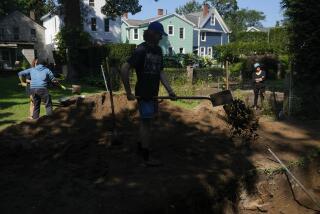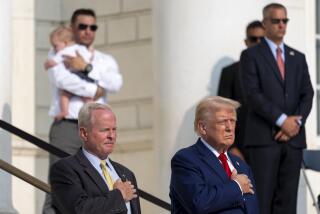Israeli Plan for West Bank Cemetery Points to Hold on Occupied Areas : Diplomacy: Even with Secretary of State Baker in town, moves are pressed for site outside Jerusalem. As usual, the issue is wrapped in controversy.
JERUSALEM — While Secretary of State James A. Baker III was in town this week urging Israel to give up land in exchange for peace with Palestinians and with Arab states, a little-publicized battle over the location of a Jewish cemetery illustrates how Israel has come to view its hold on the occupied West Bank and Gaza Strip as permanent.
The controversy involves plans by the city of Jerusalem, the Religious Affairs Ministry and the occupation government to construct a cemetery just outside of Jerusalem’s borders and inside the West Bank on the way to Maale Adumim, a large Israeli settlement.
The city says the land is needed because Jerusalem’s cemeteries are filling up. Opponents say that building the cemetery would violate international rules governing use of land in occupied territories. These rules limit construction to projects related to defense or the benefit of native populations, they assert.
Opponents suspect that the project reflects yet another attempt to make irreversible Israel’s hold on occupied land, home to 1.7 million Palestinians.
“There is nothing more eternal than burial,” said Zali Reshef, an activist in the Peace Now movement, which won a temporary injunction against the construction. “The cemetery plans show that the nature of the occupation is not temporary, to say the least.”
City spokeswoman Bonnie Boxer declared that the proposed site is only one of many under consideration and that there are other possible locations within Jerusalem’s city limits. “We’re just running out of places to bury people,” she said, adding that an alternative site within city bounds drew protests from nearby residents. West Bank Palestinian residents were not consulted.
Plans for the cemetery--critics call it the “settlement of the dead”--come on top of a burst of new projects for expanding colonies of Israeli residents in the West Bank and Gaza. Housing Ministry reports released by opposition members of Parliament propose the building of at least 10,000 new houses in the occupied lands. Other ministry plans call for more. The government says the projects have not been approved.
Last year, trailers were set up on a hilltop near Maale Adumim. The government claimed they were not the foundation of a new settlement, but only an extension of the old one, which stands a mile away. Since 1987, the population of Maale Adumim has increased from 11,000 to 14,000.
The population of Ariel, another large West Bank settlement, grew by more than half in the same period to 9,300, and more building is planned. In all, about 100,000 Israelis live in the West Bank and Gaza in about 140 settlements.
The continued settlement gives shape to the government position that by right, the occupied land belongs to Israel. That stand puts Israel in conflict with the Bush Administration and its vision for establishing a regime of peace in the Middle East.
Baker has proposed a two-track process. On one side, Arab states would end their hostility to Israel and forge diplomatic relations. On the other, Israel would make peace with Palestinians and withdraw from the West Bank and Gaza.
After Baker’s departure, Prime Minister Yitzhak Shamir was asked by a television interviewer whether he still clings to his goal of keeping all the West Bank and Gaza.
“Of course,” was his emphatic answer.
Shamir insisted that Baker never broached the land-for-peace formula laid out by President Bush in a recent speech, although aides to the prime minister said that Baker asked for Israeli willingness to comply with U.N. resolutions that call for Israel’s withdrawal from land it seized during the 1967 Middle East war, including the West Bank and Gaza Strip.
Israeli officials say this country has already complied by pulling out of the Sinai Peninsula after signing a peace accord with Egypt in 1979 and that there is no requirement to do more. They want to open talks with Arab states without conditions, a stand Washington finds evasive.
Shamir also brushed aside indications that Syria is ready to make peace with Israel under a similar land-for-peace scheme. Baker said that Arab allies of the United States in the Persian Gulf War have expressed “new thinking” about their relations with Israel.
“When they were talking about the eight (Arab) states among whom there were expressions of a different attitude toward Israel, a more human attitude I would say, Syria is not mentioned among these states,” Shamir told Israeli Television.
“He (Baker) did not say that Syria is also changing. Syria is in a category by itself. The Americans and the Western states relate to Syria differently,” Shamir added. “We don’t hear any words that are more positive toward Israel.”
Later in Baker’s trip, U.S. officials suggested that Syria may be softening its stand on Israel.
While Israel rejected the land-for-peace proposal, Palestinians and the Palestine Liberation Organization themselves seemed to be uncertain of steps that they might take to get talks under way aimed at their goal of establishing a Palestinian homeland in the West Bank and Gaza.
In London, Bassam abu Sharif, a confidant of PLO leader Yasser Arafat, made proposals that seemed to break new ground. He told British television and radio interviewers that the PLO was willing to take a backstage role in any negotiations and would be willing to work out border arrangements between Israel and a new Palestinian state.
He also said the proposed state could be demilitarized for a time.
Hours later, the PLO news agency WAFA said that Abu Sharif was speaking only for himself. Then Abu Sharif spoke on Jordan Radio, retracted what he had told the British and claimed that his views had been distorted.
More to Read
Sign up for Essential California
The most important California stories and recommendations in your inbox every morning.
You may occasionally receive promotional content from the Los Angeles Times.










